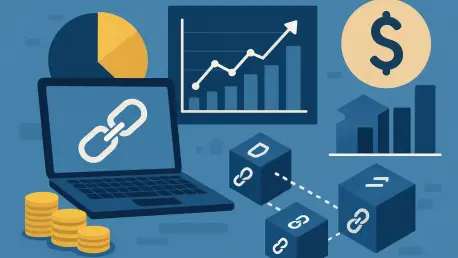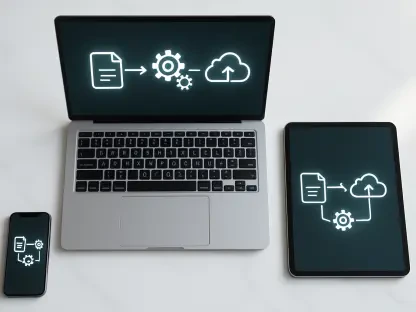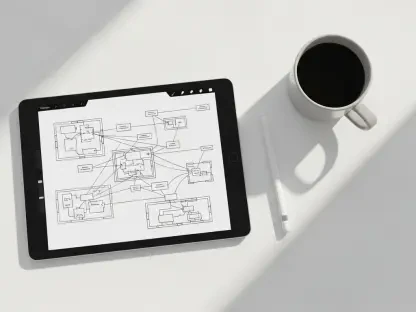The landscape of economic data reporting in the United States is on the cusp of a revolutionary change as the Department of Commerce has announced an ambitious plan to publish critical statistics, such as Gross Domestic Product (GDP), on a blockchain platform. This initiative, revealed by Secretary of Commerce Howard Lutnick during a recent White House cabinet meeting, marks a significant milestone in the adoption of cutting-edge technology for federal data management. By leveraging blockchain’s unique features, the government aims to enhance transparency, secure data integrity, and build public trust in official statistics. This bold step not only positions the U.S. as a leader in technological innovation within public administration but also raises important questions about the practical implications and challenges of such a transition. As this project unfolds, it promises to reshape how economic data is shared and perceived, potentially setting a precedent for other federal agencies to follow suit in modernizing their reporting mechanisms.
Pioneering Transparency with Blockchain Technology
The core of the Department of Commerce’s initiative lies in blockchain’s ability to create an immutable record of data, ensuring that once economic statistics are entered, they cannot be altered without consensus across the network. This tamper-proof nature of blockchain technology is expected to address long-standing concerns about data manipulation in government reporting. By providing a secure and unchangeable ledger, the system will allow stakeholders, including policymakers and the public, to access economic figures like GDP with greater confidence in their authenticity. Furthermore, the transparent audit trails inherent in blockchain enable users to trace the history of data entries, identifying any discrepancies or unauthorized attempts at modification. Such features are poised to strengthen accountability within governmental operations, fostering a new era of trust in federal statistics that have often been scrutinized for reliability.
Beyond securing data, blockchain offers a transformative approach to how economic information is distributed to the public, ensuring accessibility without compromising security. The decentralized nature of the technology means that data isn’t stored in a single, vulnerable location but across a network of nodes, reducing the risk of breaches or loss due to system failures. This initiative by the Department of Commerce could redefine public access to critical economic indicators, making them available in real-time while maintaining stringent security protocols. Importantly, this move aligns with the broader goal of modernizing federal infrastructure to meet the demands of a digital age where data integrity is paramount. As blockchain establishes a verifiable and open system for economic reporting, it may encourage greater engagement from citizens and businesses who rely on accurate statistics for decision-making, potentially reshaping the relationship between the government and its constituents.
Global Trends and Comparative Insights
The adoption of blockchain for economic data reporting by the U.S. Department of Commerce mirrors a growing global movement among governments to integrate this technology into public administration. For instance, Estonia has successfully utilized blockchain to secure e-Health records, while the European Union has developed the European Blockchain Services Infrastructure (EBSI) to support cross-border public services. Similarly, countries like Singapore and Australia have implemented blockchain trials for trade documentation, demonstrating efficiency and fraud reduction. Even within the U.S., California’s Department of Motor Vehicles has digitized millions of car titles on a blockchain to combat fraud. These international and domestic examples highlight a shared recognition of blockchain’s potential to streamline processes and enhance transparency, positioning the technology as a cornerstone for modern governance and offering valuable lessons for the U.S. initiative.
While global adoption provides a promising backdrop, it also underscores the need for the U.S. to adapt blockchain applications to its unique political and economic context. Unlike smaller nations with more centralized systems, the scale and complexity of U.S. federal data reporting present distinct logistical challenges. The success of blockchain in other regions suggests that tailored implementation, coupled with robust public-private partnerships, could be key to overcoming these hurdles. Additionally, international efforts, such as the European Union’s exploration of a digital euro on public blockchains, reflect a broader trend of using this technology to address financial transparency, a goal that resonates with the U.S. focus on economic data integrity. By learning from these global precedents, the Department of Commerce can refine its approach, ensuring that blockchain not only secures data but also aligns with national priorities and public expectations for accountability.
Challenges in Ensuring Data Accuracy
Despite the transformative potential of blockchain, a critical limitation persists in its inability to guarantee the accuracy of the initial data entered into the system. While the technology excels at securing and sharing information through an unalterable ledger, it cannot prevent errors, biases, or intentional misrepresentation at the source. This challenge is particularly significant in the current U.S. political climate, where official economic statistics have faced scrutiny and accusations of politicization from figures like President Donald Trump. Economists have expressed concerns that without addressing the quality of data inputs, blockchain’s benefits in transparency and security might be undermined by lingering doubts about the credibility of the numbers themselves. This gap highlights the need for complementary measures to ensure rigorous data collection and validation processes alongside technological innovation.
Moreover, implementing blockchain for economic reporting requires overcoming technical and operational hurdles that could impact its effectiveness in addressing accuracy issues. The complexity of integrating existing federal systems with blockchain platforms demands significant investment in infrastructure and training for personnel. Additionally, the public’s understanding of blockchain technology remains limited, which could lead to skepticism about its role in data reporting if not accompanied by clear communication and education efforts. While blockchain ensures that data remains unchanged once recorded, establishing trust in the initial figures will require robust oversight mechanisms and independent verification processes. As the Department of Commerce navigates these challenges, striking a balance between leveraging blockchain’s strengths and addressing its limitations will be crucial to realizing the full potential of this initiative in enhancing the reliability of economic statistics.
Looking Ahead to a Blockchain-Driven Future
Reflecting on the journey, the Department of Commerce took a bold step by initiating the publication of economic data on a blockchain platform, setting a precedent for transparency and security in federal reporting. This move aligned with global efforts to modernize governance through technology, demonstrating a commitment to addressing public concerns about data integrity. Challenges, such as ensuring the accuracy of source data, were acknowledged as persistent hurdles that tempered the optimism surrounding blockchain’s capabilities. The initiative’s early stages revealed both the promise of tamper-proof records and the necessity for rigorous validation processes to uphold trust.
Moving forward, the focus should shift to developing comprehensive strategies that complement blockchain’s strengths with enhanced data collection standards. Collaboration between government agencies, tech experts, and independent auditors could pave the way for solutions that address accuracy concerns. Additionally, investing in public education about blockchain’s role in data reporting might foster greater acceptance and engagement. As this project evolves, it stands to serve as a blueprint for other federal departments, offering insights into scaling blockchain applications while navigating the intricate balance between innovation and reliability in public administration.









